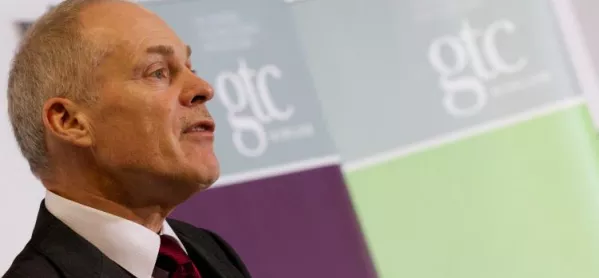- Home
- Teaching body CEO ‘sickened’ by racism in schools
Teaching body CEO ‘sickened’ by racism in schools

The head of the Scottish teachers’ regulatory body has told of the “shocking” and “blatant” racism in schools, and fears that little progress has been made over the past three decades.
Ken Muir, chief executive of the General Teaching Council for Scotland, said he was “sickened” by much of what he found in recent months, as a member of a government group set up to increase diversity in the profession.
“The biggest concern for me was the fact that we have got professional teachers in schools in Scotland who exhibit blatant racism,” Mr Muir (pictured) told Tes Scotland in an exclusive interview.
He recalled one black and minority ethnic (BME) probationer who was going to quit the profession, having felt singled out and less supported than white probationers, and after being subjected to racist comments from both pupils and staff.
“I was actually quite sickened by some of the things that folk were telling me,” said Mr Muir, stressing that his concerns were not based purely on a small number of anecdotes and that the problem was more widespread.
He was “hugely disappointed” to see that BME teachers often did not receive “the level of support that a white teacher would have got” and were “still subject to some forms of abuse, whether intentional or unintentional”.
Mr Muir said it was unforgivable for a teacher to make a racist comment or slight someone because of their race, whether intentionally or not, but that “there are still some teachers out there who haven’t got that message”.
Some of the testimonies he heard, including from BME teachers who had decided to quit their job, were “shocking”. He was also disturbed by what he found at an institutional level, whether in schools - where it was still possible to find “the kind of culture that doesn’t embrace warmly a multi-ethnic society” - or councils.
“Local authorities still saying ‘racism isn’t an issue in our authority, we don’t have any black and multi-ethnic families in this part of Scotland’ - you think, well hold on a minute, what kind of society are your weans coming out into? It is increasingly a much more multicultural, multi-ethnic society, and how are you preparing them for that?,” Mr Muir said.
Education in Scotland was “not a diverse teaching profession”, he said, with only about 1 per cent of teachers being BME, while BME people make up 4 per cent of the overall population.
Mr Muir recalled that, 25-30 years ago, multicultural, anti-racist education was starting to emerge and that there was “a huge amount of investment in it”, but this had not led to the desired level of change.
“It’s clear that some schools and some teachers are no further forward in understanding the kind of multi-ethnic society that we live in,” said Mr Muir.
He added that there remains a reluctance to deal with race issues because of a fear of legal issues, and that “some folk allow things to be swept under the carpet and not deal with in the hope that it will go away”.
Mr Muir said that the profession had to examine why BME teachers were three times more likely than white teachers to leave the profession, and added that the creation of new career pathways could form part of the solution.
The government group set up to improve the diversity of the teaching workforce last week called for Scotland to “be bold and aim high”, and ensure that by 2030 BME teachers are as well represented in teaching as they are in the general population.
The Scottish government has backed the group’s call to more than double the number of BME teachers.
Official figures show that only 1.4 per cent of the teaching workforce comes from a BME background - equivalent to just 672 teachers. The 2011 census recorded that 4 per cent of the population as a whole hailed from BME backgrounds.
Scottish government statistics also show that BME teachers are less likely to gain promotion, with just 75 BME teachers occupying 0.6 per cent of promoted posts in schools.
According to the government working group - led by Professor Rowena Arshad, the head of the University of Edinburgh’s Moray House School of Education - “this lack of promotion prospects” is discouraging people from BME backgrounds from considering a career in teaching.
The group made clear that all involved in teaching - from the universities that deliver the teacher-education courses to the councils who employ the teachers - needed to be educated about diversification and how it could be supported.
In an interview with Tes Scotland this month, Professor Arshad said there was a racial inequality “awareness gap” in Scottish education that was so sizeable it “quite stunned” the working group.
On the one hand, the research showed that BME teachers reported that their race was a barrier, said Professor Arshad, but on the other, there was a failure among schools and local authorities to recognise that racism or racial inequality was an issue.
Keep reading for just £1 per month
You've reached your limit of free articles this month. Subscribe for £1 per month for three months and get:
- Unlimited access to all Tes magazine content
- Exclusive subscriber-only stories
- Award-winning email newsletters



